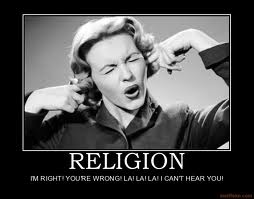 There is a great article over at AlterNet entitled “10 Myths Many Religious People Hold About Atheists, Debunked”. There you will find that Amanda Marcotte has done a great job slicing and dicing the following list …
There is a great article over at AlterNet entitled “10 Myths Many Religious People Hold About Atheists, Debunked”. There you will find that Amanda Marcotte has done a great job slicing and dicing the following list …
- There are no atheists in foxholes
- Atheists are just angry with God
- Atheists are aggressive and rude
- Atheism is a white dude thing
- Atheism is just a faith like any other
- Atheists don’t have a moral code
- Atheist lives are bleak and lack meaning
- Atheists are hedonists who don’t understand the true meaning of love
- Atheists have no way to cope after losing loved ones without the belief in an afterlife
- Atheists are out to destroy Christmas
If curious, click here to go read that.
As you look at the above, I suspect there will be two reactions. If you are indeed a believer, then you just might look down that list and nod your head thinking, “Yep that’s all correct” (if so, then you really do need to click the link and read), and if you are a non-believer you will of course be thinking something along the lines of, “Sigh, yep more delusional theist thinking”.
I used to be a believer, and I did indeed at that time hold some of the above views, I was for example 100% sure that Atheism was just another belief. In fact, I was so sure of my position that I felt absolutely confident that the only thing between myself and the Atheist position is that they simply lacked a bit of information that I had, and if they knew what I knew, then they would change their minds.
Quite obviously I changed my mind and now hold a more rational evidence-based viewpoint. This however leads to a very obvious question, I was once sure that I was right, but changed my mind, and so I now hold a view that is quite different, so how can I be certain that the view I now hold is correct and is not just as delusional as the previous one?
To answer this we need to think about how we arrive at ‘truth’ and why we often choose to embrace an irrational view that is contrary to the evidence.
- Religion is a system that is not based upon empirical evidence, but is instead an attempt to grasp understanding and meaning by asserting supernatural claims. This is the means our ancestors deployed as they attempted to comprehend the world.
- Closed to criticism
- Generally hostile to reason
- Starts with the conclusion then seeks evidence that confirms it, and dismisses any that conflicts with it
- Appeals to tradition and ancient texts.
- The scientific method has given us a better way for determining truth. Through this we look for actual evidence and only accept things that can be proven, and refute all that has no evidence. If new evidence is presented for a newer better understanding, then we embrace that newer understanding
- Open to criticism
- Embraces reason
- Starts with the evidence, forms a hypothesis that explains what is observed, then tests it to verify the conclusion.
- Builds upon established facts.
The point I wish to draw out here is that the move from being religious to becoming an atheist is not akin to simply embracing a different set of beliefs, but instead consists of putting aside an older form of ‘truth’ seeking for a far superior means for doing the same – the scientific method. It involves asking good questions such as, “Why do I believe this to be true?”, and “How do I know this is true?”. It is the journey down this road that leads to a more skeptical evidence-based means of understanding. Atheism just happens to be a natural outcome from this process, and as such is not a belief of any kind, nor is it a community you join, but rather is coming to the realization that for all the claims that “God is real”, not one single jot of credible evidence exists.
A debate between a believer and a non-believer is not simply a clash between different views, but is the boundary between two entirely different ways for arriving at ‘truth’.
So how can I retain confidence in my current view? Easy, it is not hammered in stone, just present me with actual measurable evidence, and I’ll change my mind, and as for the silly religious claims regarding supernatural deities … well, I’ll not be holding my breath while I wait.
“I used to be a believer.” No, my friend. You were never born of the Spirit to begin with.
Funnily enough William, that is exactly what I would have said when faced with somebody such as myself, so I do understand your stance. As an aside, I can even still quite happily speak in tongues … deploying the “No true Scotsman” fallacy might indeed give you comfort, but it does not in any way alter the stark reality that I was once exactly where you currently are.
I would assure you that you can be free and need not remain ensnared by the psychological trap you are currently gripped by, you can step out of darkness in the light of reason.